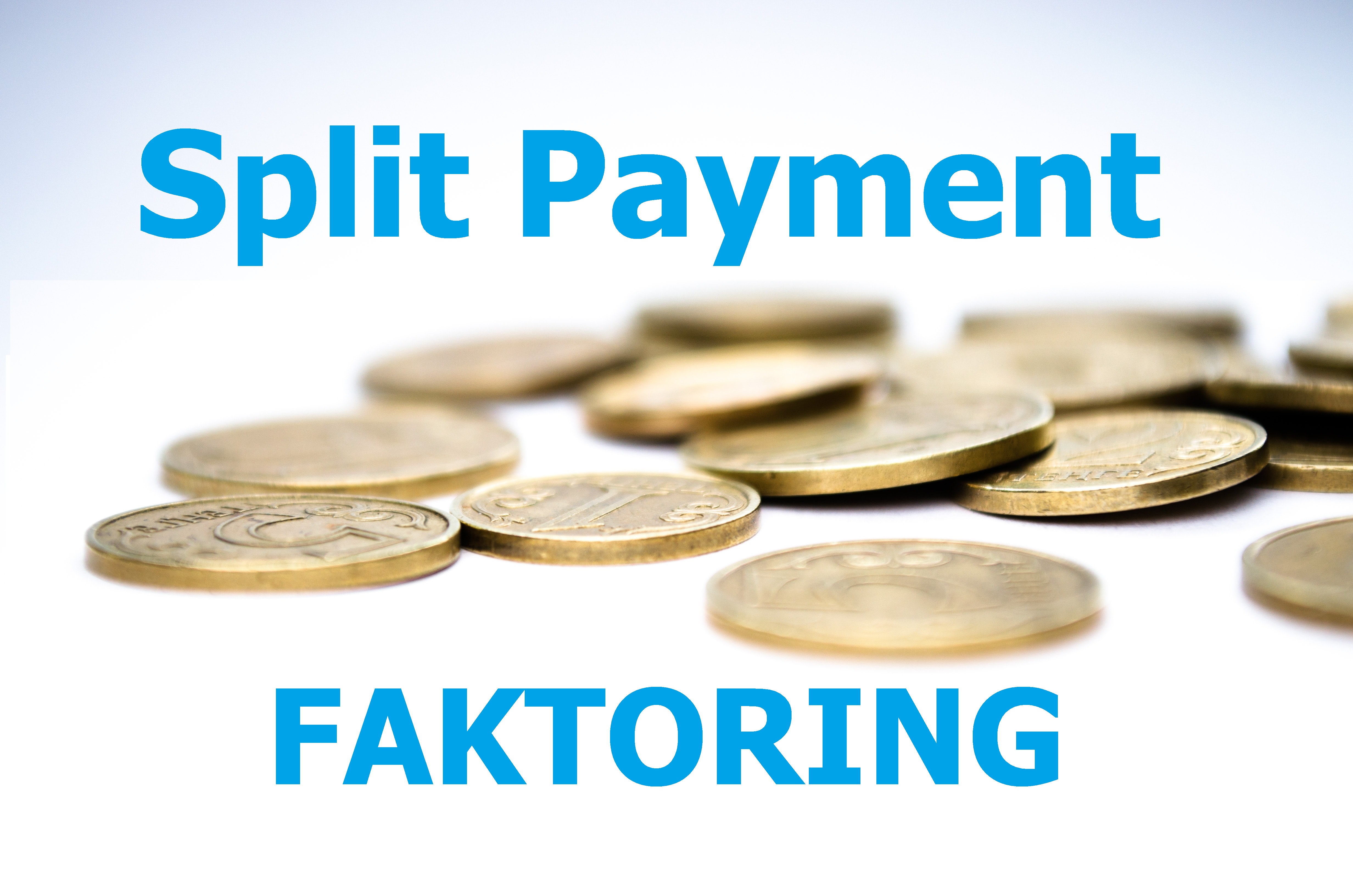As of 1.07.2018, the Split Payment Mechanism ("MPP") or so-called "split payment" ("SP"). You will read about the practical aspects of this change for companies here. In contrast, this article will describe MPP from the point of view of the activities of factoring companies - primarily in the context of partial and full factoring. In this article I do not address the dissimilarities associated with silent and reverse factoring.Split Payment I embrace the factoring industry in an almost complete way. There is no escaping it. After all, factoring is a b2b product, so its scope of application corresponds to that of MPP. This also applies to factoring for TSUs, which also fall under MPP.
SP topics for the factoring industry cover many aspects, including but not limited to (i) the factoring company's liability for VAT, (ii) the choice of a form of exclusion of this liability, (iii) the rules for advance payment, (iv) changes in the amount of advances, (v) the relationship of the factor to the MPP expressed in contractual provisions, (vi) differences for different factoring industries, (vii) adaptation of IT and accounting systems, and contractual provisions, and much more.
- Legal basis
MPP was introduced into the Law on Value Added Tax of March 11, 2004 as Article 108a et seq. The provisions will take effect on July 1, 2018, and will cover payments made as of that date.
- Mechanism of action of SP in factoring
Contractors (debtors) who received a VAT invoice ("FV") with the VAT amount shown, when paying the amount due under this invoice, they can either make a traditional transfer or use MPP and pay for the FV by SP transfer to the Factor's account. Then, for example, when paying for an FV in the amount of PLN 123,000 gross (PLN 100,000 net) - the amount of PLN 23,000 will be taken from the Contractor's VAT account, and the amount of PLN 100,000 from the current account. If there are insufficient funds on the VAT account - the missing funds will be taken from the current account.
If the Contractor makes payment to the account of the Factor:
- by ordinary bank transfer - Nothing changes with respect to the existing factoring settlement rules;
- by SP transfer - then on the Factor's account the incoming transfer will be automatically divided. The amount of PLN 23,000 will be credited to the VAT account (sub-account), and the amount of PLN 100,000 will be credited to the current account indicated on the FV and/or factoring clause.
- Factor's liability for VAT
The problem of MPP for factoring activities arises primarily from the joint and several liability of the Factor receiving payment for the invoice issuer's VAT. This is because according to Article 108a (5-6) of the VAT Law:
"(5) Where payment is made in the manner specified in paragraph (2) to a taxpayer other than the one indicated in the invoice referred to in paragraph (3)(3), the taxpayer to whom such payment was made shall be jointly and severally liable with the supplier of those goods or service provider for the tax not settled by the supplier of those goods or service provider arising from that supply of goods or that supply of services to the extent of the amount received on the VAT account.
6.Joint and several liability of the taxpayer referred to in paragraph 5 shall be excluded in the event that this taxpayer makes payment to the VAT account of the supplier of goods or services indicated in the invoice referred to in paragraph 3, item 3, or returns the received payment to the VAT account of the taxpayer from whom the payment was received, immediately after becoming aware of its receipt, in the amount received to the VAT account. The provision of paragraph 3 shall apply accordingly.".
The wording "factor" does not fall in the aforementioned legislation, but during the legislative process and public consultations it was clear that the provision specifically refers to the factoring/banking/creditor industry.
Simplifying: if the Counterparty pays the Factor for the purchased invoice by SP transfer, then the Factor is jointly and severally liable with the Factor for the Factor's outstanding VAT on the purchased invoice. The above generates a significant risk for factoring companies (especially in the context of possible insolvency of the Factor).
- Factor's release from liability
In order to relieve itself of this liability, the Factor may immediately upon receipt of the SP transfer:
- Transfer the full amount of VAT to the Factorant by SP transfer to the VAT account, or
- Return the full amount of VAT to the Contractor by SP transfer to the VAT account.
Rather, there is no doubt that factoring companies will choose option (a), i.e., make a SP transfer to the Factor's VAT account. This is because they will thereby increase its liquidity in the VAT account, which, after all, is useful in the context of possible recourse, regardless of the fact that the ability to dispose of funds in the VAT account is very limited. As a rule, improving liquidity in the VAT account will come at the expense of reducing liquidity in the current account. This will result in a per balance deterioration of liquidity for companies (inflows to the current account will be lower by 23%), which is due to the fact that the ability to dispose of funds in the VAT account will be limited. In addition, making a transfer of this amount may be settled by the Factor itself, e.g. in the form of a subsequent deduction.
The possibility of discharge of liability is the result of active lobbying during the public consultations for the amendment of the VAT Act. Lewiatan, the Economic Chamber of Land Transport, the Polish Bank Association, the Polish Association of Employers of the Pharmaceutical Industry, KGHM, ZIPSEE Cyfrowa Polska, the Association of Energy Trading, the Polish Association of Employers of the Pharmaceutical Industry, and the Polish Organization of Commerce and Distribution submitted their comments on factoring and assignment of receivables, with the first 3 entities describing the threats to the factoring industry most extensively.
- The problem of the Factor not having a business account
I would like to draw your attention to the fact that in order to be released from liability, the Factor must make a SP transfer for the amount of VAT. To make this transfer - the recipient must have a dedicated company account. This is because only such an account has a VAT sub-account. The problem - especially for micro-factoring - are sole proprietors using private accounts for business purposes. This is because such entities will not be covered by MPP for technical reasons. Contrary to appearances, there are quite a few such companies on the market. I described the problem in more detail here.
With the above in mind, in order to be relieved of liability, the Factor must enter into agreements only with Factors using only dedicated corporate accounts. The above should be made a condition for entering into a factoring agreement. It would be advisable to check whether all Factors actually use dedicated company accounts (this should be evident from the very designation of the transferor - name or full company name). It is therefore simple to check.
- Principles of advance payment by the Factor
The introduction of MPP offers the possibility of various forms of financing for purchased invoices.
Possible seems to be:
- remain with the current method of advance payment by ordinary bank transfer a specified percentage of the gross VAT invoice (e.g., 80%/85%/90%);
- payment by simple transfer of the net amount itself;
- advance payment by SP transfer - the entire amount of VAT and part of the net amount;
- use of intermediate solutions, e.g. 80% gross amounts transferred by SP proportionally.
Personally, I take the position that the Factor should transfer the advance only by ordinary (traditional) transfer, not SP. This follows from the wording of Article 108a of the VAT Law: "Taxpayers who have received an invoice with the amount of tax shown, when making payment of the amount due under this invoice, may apply the split payment mechanism.". My interpretation of this provision is that the Factor does not pay the amount due from this invoice but the selling price of the receivable (advance payment), which means that he should not apply SP. This is because the Factor is not the "taxpayer who received the invoice" - it is the Contractor indicated on the invoice. In addition, in addition to the above-mentioned legal aspects, there are also technical aspects (the Factor, when making a SP transfer, must enter the invoice number), practical (a traditional transfer is simply more convenient) and liquidity aspects (a traditional transfer better increases the liquidity of the Factor, which is, after all, the essence of factoring). However, the prevailing position of factoring companies nowadays is that the SP transfer for advance payment is acceptable and the FV number given is simply the number of the FV covered by the redemption under the factoring agreement. Some factoring companies will implement SP transfers to further protect themselves from VAT.
The simplest solution is to stay with the current method of advance payment by traditional transfer, with the caveat that entering the 90% level involves a risk for the Factor. In addition to paying 90% of the value of the invoice, the Factor still has to pay the Factor all the VAT resulting from the VAT invoice in order to be released from liability. In practice, therefore, it will pay the Factor almost 109% of the gross value of the VAT invoice! In this situation, it seems that factoring companies are unlikely to decide to keep advances at 90% (if they used them at all). A safer solution will be an advance at 80%. The Factor will then still reimburse the Factor for a portion of the unfunded amount (about 1.3% of the gross FV value). Of course, these rules can be shaped differently within the advance deduction. In particular, it is possible to stay with the current amount of advances and recover the transferred VAT as a deduction. It seems that the possibility of reducing the amount of the advance payment will rather apply to separate factoring institutions. This is because banks have the ability to make deductions from current accounts.
- Principles of accounting for payments received by the Factor
The rules of settlement of payments of Contractors depend on whether the Contractor makes payment by traditional transfer or by SP transfer.
In the case of a traditional transfer - factoring settlement can remain under the existing rules from before the introduction of MPP. This is because the risk of the Factor's liability for VAT will not arise.
In case of payment by the Contractor by SP transfer - settlements must be changed. For the purpose of the example, let's use a VAT invoice for the net amount of PLN 100,000 (PLN 123,000 gross, including PLN 23,000 VAT).
- Assuming for simplicity that there were no commission deductions, the Factor paid the Factor an advance of 80% of the gross value of the FV (PLN 98,400) by simple wire transfer;
- The contractor paid the entire invoice amount (PLN 123,000) to the Factor by SP transfer. The bank automatically divided the payment and the Factor's current account received PLN 100,000 and the VAT account received PLN 23,000;
- At this point, the Factor, wishing to relieve itself of liability, transfers the amount of PLN 23,000 by SP transfer to the Factor's VAT account (the transfer message should specify the VAT amount equal to the gross amount of the payment);
- If there is an Unfunded Amount remaining to be settled - then the Factor pays it to the Factor. If it is the Factor that should be reimbursed - then it makes the remaining deductions, unless it has already made them at the advance payment stage.
Of course, this mechanism is not perfect. Even at first glance, you can see that the structure, so to speak, collapses in a situation where the Contractor has not paid for the FV or has paid in an incomplete amount. But this is, after all, a general risk of factoring. The provisions of the VAT Law do not provide any relief in such a situation for the Factor, who, in order to free himself from joint and several liability for VAT, may pay the VAT amount regardless of whether the Counterparty has paid. The regulations only set a limit on the Factor's liability "up to the amount received on the VAT account."
- Can a Factor not change anything about its business despite the MPP?
Yes. A factoring company can in fact will not feel the changes at all if it does not react to them and settle factoring under the existing rules. However, this involves the risk of liability for the Factor's unsettled VAT, as indicated in the VAT Law. It is difficult to imagine any factoring company taking on such a risk without adequate security. Of course, it is possible to contractually shape recourse for such liability to the Factor, but when the Factor's failure to pay VAT comes to light it will most likely be too late - the Factor will probably be insolvent. Therefore, in order to sleep soundly, the Factor would have to increase the Factor's collateral - effective against potential insolvency - e.g., secure the contract early enough with a mortgage/registered pledge/guarantee/casualty/collateral transfer. It seems that in the case of factoring for micro-companies or full factoring - such an action is unrealistic in the market. On the other hand, the very control of tax settlements (including VAT returns) of the Factor is on the one hand another administrative duty of the Factor, and on the other hand - the risk of overlooking non-payment or concealment of real settlements by the Factor.
It is also possible for a Factor that operates in a very specialized business, e.g. finances only invoices issued with VAT 0% or the "ZW" rate, not to feel MPP. Such payments are made by traditional transfers. This is because the SP transfer is made only for the payment of FV which provides for VAT. One can imagine such a situation, for example, for international transport.
- Can contractors be forced to pay by traditional transfers?
It is obvious that it is in the interest of the Factor that Contractors pay by traditional transfers. This is because the risk of VAT liability does not then arise and the settlement itself takes place on a proven basis. Nor does the Factor itself reduce its liquidity by not 'pumping' the amounts in the VAT account.
So the question arises - if and what can a Factor do to receive as many repayments as possible from Contractors by traditional transfers instead of SP?
First of all, you need to be aware that the Factor is not bound by any contract with the Counterparty, so it cannot change its terms by providing, for example, a contractual penalty. For ongoing factoring agreements, the options here are very limited. One option is to change the template of the Notice of Assignment (ZOC) providing for the Contractor's obligation to pay by traditional transfers. Another option is to amend the factoring agreement providing for the possibility of motivating the factor to take on the burden of convincing the Counterparty to pay by traditional transfers. The form of bonus here can be anything from a lower commission to other perks related to financial terms. An alternative is also the introduction of a contractual penalty - although here there are doubts whether in this mode the Factor can be held responsible for the Contractor's payment of invoices in a manner, as it were, that is legal. One could also consider amending the Table of Fees and Commissions by introducing a fee for an SP transfer made by the Counterparty (in fact this will be a form of contractual penalty for the action of a third party).
- Other SP issues for the factoring industry
- MPP does not allow you to make bulk transfers/packages of transfers, each SP transfer requires an individual VAT invoice number;
- Given the above, MPP may incur additional fees for transfers based on the banks' regulations - at least where they used to be collectively feasible with a lower fee - now the bank will be able to charge each SP transfer separately;
- Through SP you cannot pay for proforma invoices, you can only pay for advance invoices;
- The introduction of MPP requires adaptation of factoring companies' IT and accounting/settlement systems;
- The introduction of MPP may involve increased work for factoring companies' operations departments (returning VAT by SP transfer, etc.) - probably not everything can be automated, or at least done right away;
- A factor offering full factoring on a policy should verify the insurance rules after the introduction of MPP - whether they have not changed and remain correlated with the liability of the full factoring agreement;
- Narrower scope of MPP in construction and transport industry
The construction industry has a reverse VAT charge for subcontractor work. Thus, this industry will be largely excluded from MPP. The subcontractor will charge only the net price (excluding VAT) of the goods and services sold on the FV, and VAT will be charged by the general contractor. Thus, the general contractor will not settle its obligations through SP transfer. This is because this one does not apply to VAT invoices with a rate of 0% and "ZW". There is a chance that in 2019 the reverse charge will be replaced by an obligatory MPP.
In the transportation industry, on the other hand, a significant portion of sales are made with zero VAT (especially international transportation). Such transfers are not made by SP transfer.







